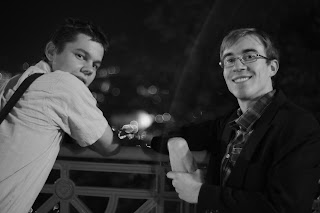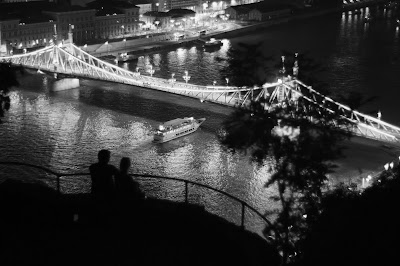“Max, you are a
bridge,” said Tibor, as we stood in a small country road, Mike taking pictures
of the fields that sprawled out towards the lowering sun. “I am very glad to know you.” He meant that I was a connection— a bridge
between families, across borders, and even generations. I had never met him before yesterday–indeed, had barely heard of him. Now, Mike and I were staying with my uncle and his family in their house on the hill above the town where my grandfather was born.
That afternoon, Tibor had taken us out to the countryside to see the farmhouse he and his family had been building for over ten years. It was quite incredible— to see the wooden bones of the house, hewn from trees Tibor himself had found and chopped down and sanded, and the walls made of mud bricks that the entire family had made by hand, and laid themselves. Tibor had pointed out where everything would be— where the kitchen and the washrooms stood yet as ghosts amidst the raw timber and emptiness, where the bedrooms would be, and who would sleep where; there was even going to be a loft for baling hay, for there would be horses, too.
That afternoon, Tibor had taken us out to the countryside to see the farmhouse he and his family had been building for over ten years. It was quite incredible— to see the wooden bones of the house, hewn from trees Tibor himself had found and chopped down and sanded, and the walls made of mud bricks that the entire family had made by hand, and laid themselves. Tibor had pointed out where everything would be— where the kitchen and the washrooms stood yet as ghosts amidst the raw timber and emptiness, where the bedrooms would be, and who would sleep where; there was even going to be a loft for baling hay, for there would be horses, too.
As we had stood
there, in the half-finished home that had taken ten years to build, and would, he told us, take at least another ten years to complete, Tibor motioned to everything
around us and said, “This is my dream.”
It was hard not to get a little swept up by it; a rustic retreat built
together by a family— something they could say was truly theirs, down to the
very bricks. I imagined the summer
months they had sweated away here, saw the homemade crucifix of twigs latched
together over a humble makeshift table where they must have taken their
supper.
I looked out the back, where the open-air portico surveyed a wide hill of endless golden grass. Tibor had explained that he could have taken what money they have and divided it seven ways (!) amongst all the kids, but that it would not have been enough to even buy a flat. Putting that money into building the farmhouse, however— this was a team-building exercise. A family-building exercise. Something that all the children could enjoy long after it was completed. Something solid, to be held with the hands.
I looked out the back, where the open-air portico surveyed a wide hill of endless golden grass. Tibor had explained that he could have taken what money they have and divided it seven ways (!) amongst all the kids, but that it would not have been enough to even buy a flat. Putting that money into building the farmhouse, however— this was a team-building exercise. A family-building exercise. Something that all the children could enjoy long after it was completed. Something solid, to be held with the hands.
As we drove back
to Pécs, I couldn’t help but reflect on what this man had accomplished, and my
own childish obsession with immortality.
What did any of that really mean, next to building something with your
hands, and having a great, adoring family, and being a good man?
Tibor told us he
thought the “modern world” was unstable, and that in a couple generations it will
be gone, and that is why we must learn practical things, such as how to work
with our hands. While I’m not sure I
agree with his socio-cultural forecast, I was still greatly awed by what he and
his family had built, and I think there is an undeniable
immortal value to being able to work with your hands. And, after all, wasn’t the pride he had from
building that house and seeing his family bond while doing it just as great, if
not greater, than the pride one would get from releasing a best-selling album
or novel? And wasn’t the product more
tangible and long-lasting? More meaningful?





































